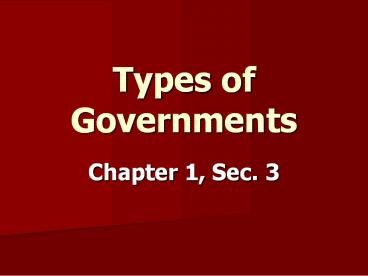Types of Governments - PowerPoint PPT Presentation
Title:
Types of Governments
Description:
Title: Aristotle s 3 Categories Author: CCS Last modified by: CCS Created Date: 8/19/2004 7:50:32 PM Document presentation format: On-screen Show (4:3) – PowerPoint PPT presentation
Number of Views:48
Avg rating:3.0/5.0
Title: Types of Governments
1
Types of Governments
- Chapter 1, Sec. 3
2
Bell Ringer 1.3
- On a half sheet of paper, please complete the
prompt independently. - How would a group of teenagers behave if they
were placed in a state of nature? Would a leader
emerge? How would they make decisions? Explain!
3
Do we need Government?
- Discuss the social contract theory.
- Why do we live in communities?
- What do we expect government to do for us?
- Protect rights
- Provide services
- Promote economic growth
- Keep us safe
4
Aristotles View
- Believed all governments could be placed in one
of three categories - AutocracyRule by 1
- OligarchyRule by a few
- DemocracyRule by many
5
Autocracies
- Totalitarian Dictatorship
- Rule by force (Ex.?)
- Backed by military
- No rights or choice in government
- Absolute Monarchy
- Divine right (Ex.?)
- Total authority
- Few exist today
6
Oligarchies
- Rule by a few
- Communist nations are often run this way.
- Decisions are made by a ruling board (Politburo)
decisions are implemented by the Premier (leader) - If the leader is also the head of the military,
government may be autocratic in nature.
7
Democracies
- Greece was the first real democracy.
- Most dominant form of government today in the
world. - Democracies vary greatly in practice, scope, and
structure.
8
Characteristics of Democracies
- Not all democracies are republics.
- Value liberty and freedom.
- Have majority rule with minority rights.
- Conduct free elections.
- Allow competing political parties.
- Have highly educated populations
- Free Enterprise
9
Constitutional Monarchies
- In theory, Constitutional Monarchies are
autocracies. - In practice, though, they are democracies.
- Nearly all constitutional monarchies are
Parliamentary Democracies. - The monarchs are largely ceremonial.
- The power lies in the hands of the countrys
prime minister.
10
Constitutional Monarchies
King Bhumibol of Thailand
Queen Elizabeth II of UK
PM Niwatthamrong
PM David Cameron
11
Presidential versus Parliamentary
- President elected by people either directly or
indirectly - Prime Minister chosen by the party
- Both are chief executives
- Prime minister is the leader of Parliament
- President is separated from legislative branch.
- President has a set term of office.
12
Can Democracies Last? P. 9
- Read the handout.
- Where are we in this lineup?
- Can we escape this fate? If so, what will it
take? If not, why do you feel we cannot? - Will we escape this fate? Defend your response.
- Does it bother or surprise you that this excerpt
was written in 1857?
13
What are the Principles of American Democracy?
- List each of these on page p. 10. Define each in
your own words. Then, illustrate an example. - Rule of Law
- Limited Government
- Consent of the Governed
- Individual Rights
- Representative Government































